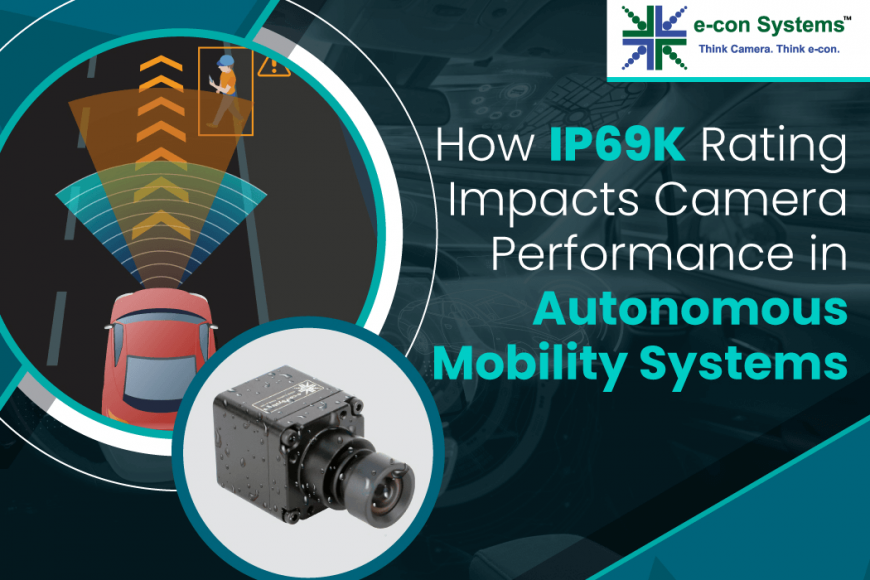How IP69K Rating Impacts Camera Performance in Autonomous Mobility Systems
This blog post was originally published at e-con Systems’ website. It is reprinted here with the permission of e-con Systems. In this blog, you’ll discover what capabilities are required to achieve the IP69K rating and its benefits for camera solutions that power autonomous mobility systems. The Ingress Protection (IP) rating system is a recognized standard […] The post How IP69K Rating Impacts Camera Performance in Autonomous Mobility Systems appeared first on Edge AI and Vision Alliance.

This blog post was originally published at e-con Systems’ website. It is reprinted here with the permission of e-con Systems.
In this blog, you’ll discover what capabilities are required to achieve the IP69K rating and its benefits for camera solutions that power autonomous mobility systems.
The Ingress Protection (IP) rating system is a recognized standard for determining the level of protection an electronic device has against external elements like liquids and solids. Specifically, the IP69K rating is one of the highest levels of protection within this system. This rating is denoted by the letters’ IP’, followed by two numbers. The first number indicates the degree of protection against solid particles, while the second represents protection against liquids.
In this blog, you’ll discover what capabilities are required to achieve the IP69K rating and its benefits for camera solutions that power autonomous mobility systems.
Understanding the IP69K rating
The IP69K rating is a guarantee of resilience and reliability in cameras used for autonomous mobility systems. As autonomous technology expands into different environments, the importance of such high-level protection can’t be understated. There are two types of protection it entails, namely:
- Protection against solids: The first digit, which is ‘6’, signifies that the device is completely dust-tight. This level of protection ensures that no dust particles can enter the device. Dust can impair the camera’s lens and internal components, leading to inaccurate image capture, which is detrimental in autonomous navigation systems.
- Protection against liquids: The second digit in the IP69K rating, represented by ‘9K’, is indicative of the device’s ability to withstand high-pressure, high-temperature water jets. This is relevant for cameras in autonomous mobility systems as they often face exposure to various forms of moisture, including rain, splashes, or even direct water jets during cleaning processes.
Why IP69K-rated cameras are a perfect fit for autonomous mobility systems
Dust-tight assurance
The ‘6’ in the IP69K rating guarantees that cameras are fully protected against dust ingress and ensures their functionality in environments laden with particulate matter such as sand, pollen, and other fine particles. In industries like construction or mining, where dust is a constant challenge, this protection is critical to maintain image clarity and prevent abrasive damage to the camera internals.
Moreover, dust-tight cameras mitigate the risk of static build-up, which can be detrimental to sensitive electronic components, thereby extending the operational life of the camera.
Endurance against high-pressure water jets
The ‘9K’ component of the IP69K rating signifies that the camera can withstand simple water exposure and high-pressure jets from any direction. It is necessary for scenarios like heavy rain or high-sea conditions, where cameras are exposed to forceful water sprays. The rating also implies that the camera can endure steam-cleaning processes, a common practice in the food processing or pharmaceutical industries.
This level of protection is crucial for maintaining optical clarity and preventing water from seeping and triggering short circuits.
Enhanced safety, performance & reliability
An IP69K-rated camera’s operational reliability extends to its ability to function in environments with fluctuating temperatures and high humidity, conditions that can be challenging for electronic devices. This reliability is especially crucial in outdoor autonomous systems, where cameras are exposed to natural elements continuously.
The rating offers a higher level of safety and performance for these systems, thereby assuring minimal downtime due to environmental factors. It ensures that autonomous systems can operate reliably over extended periods, which is crucial for applications like long-haul transportation or outdoor surveillance.
Regulatory compliance
Regulatory compliance in the autonomous industry often requires adherence to specific standards for safety and reliability. IP69K-rated cameras are a crucial component in meeting these standards. Such cameras are built to withstand high-pressure and high temperature washdowns, ensuring that autonomous systems can operate reliably in challenging conditions without compromising on safety or performance.
STURDeCAM31 – an IP69K-rated camera by e-con Systems
e-con Systems, with 20+ years of experience in designing, developing, and manufacturing OEM cameras, recently launched STURDeCAM31, a state-of-the-art 3MP 120dB HDR camera built specifically for use in autonomous vehicles and systems.
The STURDeCAM31 exemplifies the application of the IP69K rating, as it can operate optimally in various weather conditions. This includes maintaining clear, high-resolution image capture even in challenging situations. Its robust, IP69K-rated enclosure ensures optimal performance in diverse settings, whether dust-laden warehouses or outdoor applications with fluctuating weather.
STURDeCAM31’s durability also ensures a longer lifespan, even in settings that are traditionally challenging for electronic components.
To explore our diverse product portfolio, check out our Camera Selector page.
If you need any help whatsoever in integrating IP69K-rated cameras into your embedded vision devices, please write to us at camerasolutions@e-consystems.com.
Suresh Madhu
Product Marketing Manager, e-con Systems
The post How IP69K Rating Impacts Camera Performance in Autonomous Mobility Systems appeared first on Edge AI and Vision Alliance.





































